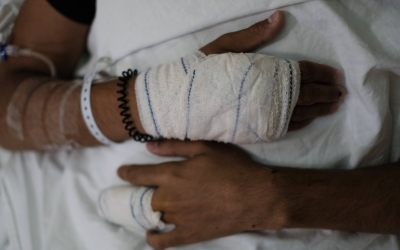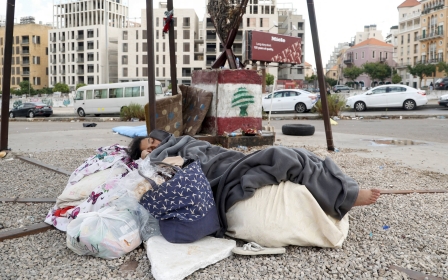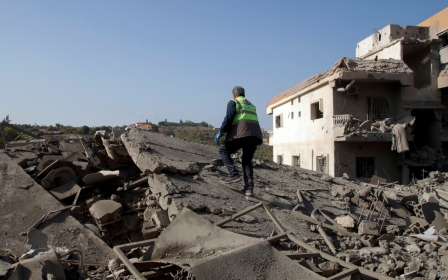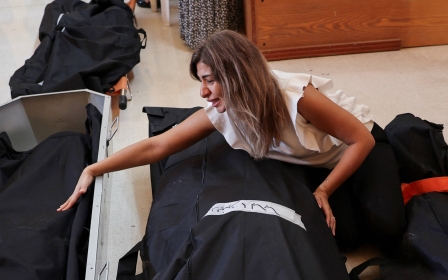'With Israel no one is safe': North Lebanon village reels after deadly air strike
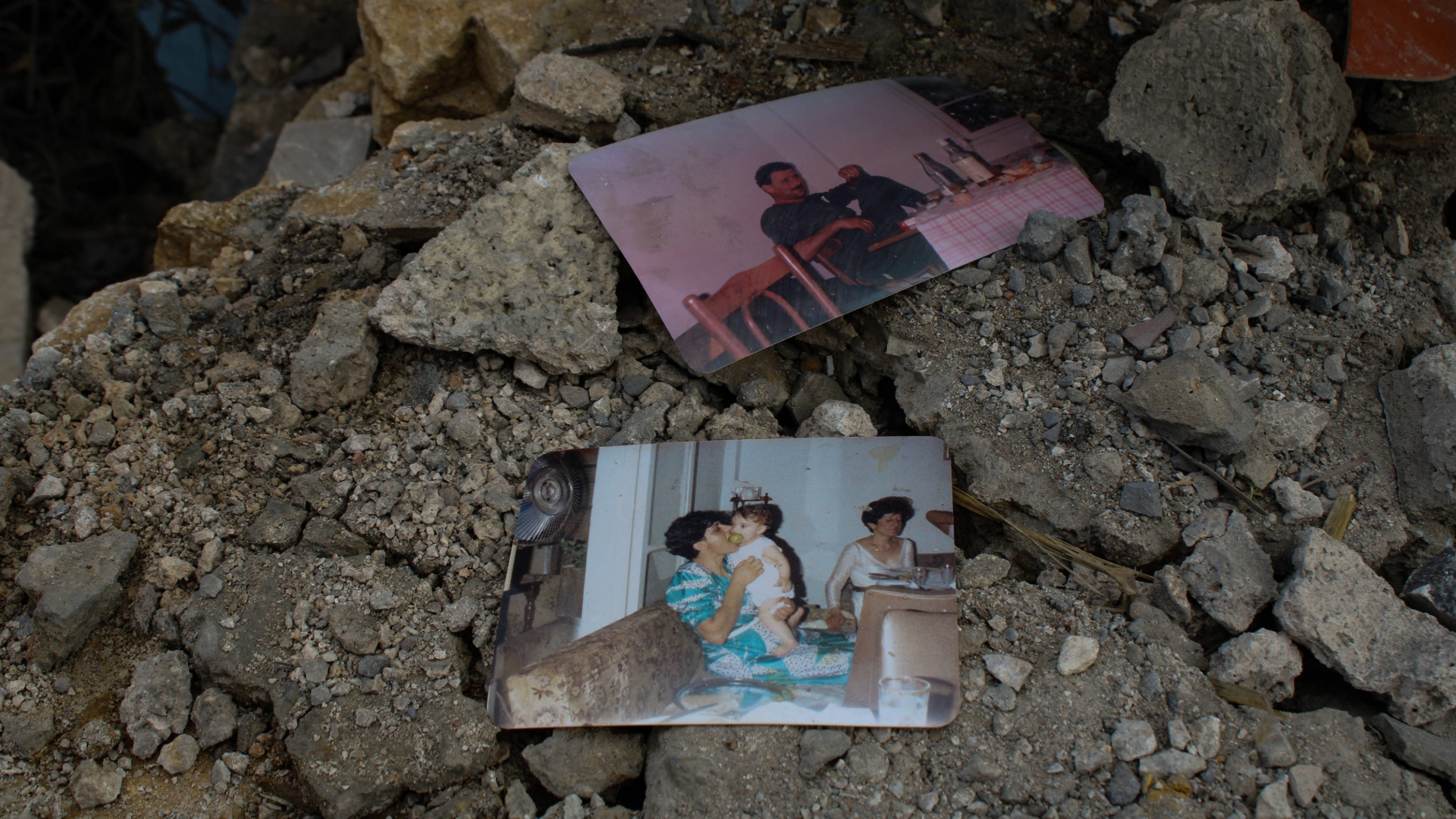
The sweet, sickly smell of human flesh permeated the air in the mountain village of Aitou, in northern Lebanon. Rescue workers dug through the rubble, picking up body parts of the men, women and children killed in an Israeli air strike on Monday.
Childrens’ clothes, likely blown out in the blast, hung on olive trees, broken and coated in grey cement dust. Next to blood-soaked stones were spoons, shoes, coffee pots, and family photos.
The Israeli strike killed at least 23 people and wounded eight others - leaving not one person in the building unscathed. The attack was the first time the Christian-majority village has been targeted since Israel and Hezbollah began fighting over a year ago.
The normally quiet village is far from Hezbollah’s main areas of influence in the south and east of the country, which have suffered the brunt of the Israeli attacks.
The owner of the now-demolished apartment building, Eli Alwein, 42, told MEE he had rented it out to around 28 people from the Hijazi family, who had fled their southern border village of Aitaroun and had been living in the apartment for about 20 days.
New MEE newsletter: Jerusalem Dispatch
Sign up to get the latest insights and analysis on Israel-Palestine, alongside Turkey Unpacked and other MEE newsletters
Eli said that just before the Israeli attack at around 2pm on Monday, five strangers drove up to the building in two vehicles unfamiliar to local residents and offered the displaced families money and aid, based on the testimony of his brother, who lives next door with his wife Jihane.
Cars around the scene of the attack were destroyed, their windows blown out and bodies crushed from the force of the blast. One vehicle bore significantly more damage than the others, it was warped and charred and its hood had been completely demolished. Eli said the vehicle was one of the two vehicles that had come to visit the residents.
Israel said it struck a target linked to Hezbollah, without providing details nor evidence, but the United Nations has called for an independent investigation.
“Even if there was someone from Hezbollah here, they shouldn’t attack places where women and children are taking shelter. [Israel] has its own ways of targeting these leaders, but they shouldn’t attack where civilians are located,” said Rene Mouwad, one of Eli’s relatives who arrived at the scene about 15 minutes after the strike.
Richard Weir, a senior crisis, conflict, and arms researcher at Human Rights Watch, told MEE: “Any attack must take into account the basic laws of war, which require an attack to be proportionate, discriminate, and for the attacker to take all feasible precautions to avoid or otherwise limit civilian harm. This includes the choice of weapon, as well as the time and location of the attack.
“Israel has demonstrated its ability and weapon choice to tailor its strikes to limit their effects,” Weir said.
‘With Israel, no one is safe’
The UN said 12 women and two children were among the people killed in the strike on the four-story residential building.
"With these factors in mind, we have real concerns with respect to IHL [international humanitarian law], to the laws of war and the principles of distinction, proportion and proportionality,” UN human rights office spokesperson, Jeremy Laurence, said on Tuesday.
'They were simple people, women and children, they were quiet and very gentle'
- Jihan Alwein, resident
Next door to the demolished building, Jihane Tarbay Alwein, 47, sat in her kitchen, shaken up by the attack. Outside her glass-shattered window, a bulldozer lifted huge chunks of concrete from where her new neighbours had sought safety.
She wore a small cross necklace, which she fingered as she spoke. She recounted to MEE that she was on her balcony, writing in a notebook, when she heard a loud boom. Seconds later, the huge plume of smoke cleared and revealed a bloody scene below.
She rushed down from her balcony and ran to help a young woman lying on the ground. “She was all covered in blood,” Jihane remembered.
Just hours before the attack, she was sitting with one of the women in the building over coffee. “They were simple people, women and children, they were quiet and very gentle,” she said with a sniffle.
Over the 20-minute coffee, the woman told her how she had been displaced from her village, Aitaroun, for over a year. “They went from their village, to another one, then to Beirut, and then to here,” Jihane said.
“We all thought it was safe,” she added. “But with Israel, no one is safe.”
‘Israel is trying to create a conflict between us’
Some locals at the scene of the Aitou attack speculated that it reflected Israel’s attempt to sow division in Lebanon. Israeli Prime Minister Benjamin Netanyahu on 8 October called on the Lebanese to “free your country from Hezbollah”.
In the week following Netanyahu’s announcement, Israel expanded its strikes from areas they were previously targeting, mainly Beirut's southern suburbs, Dahiyeh, and southern and eastern Lebanon.
On 10 October, two Israeli strikes hit central Beirut, killing at least 22 people and wounding 117 others.
Over the weekend, on 12 October, Israel hit Lebanon's northern Batroun district and the Barja village in the southern Chouf district - previously untouched. Both strikes also hit buildings housing people displaced from the south.
Sleiman Frangieh, who is the leader of Marada, a Christian party in a political alliance with Hezbollah, was born in Zgharta, near Aitou. He said: "What happened in Aito also happened in Deir Billa (Batroun), Maaysra (Kesrouan) and other villages, with the aim of creating a negative atmosphere and internal conflicts, which is very dangerous, especially for Christians.
“Israel is trying to create a conflict between us and the displaced people,” Mouwad, from Aito, said, “But it won’t work because these people are our brothers and sisters and they are welcome to live with us.”
Anger at US
Mouwad said his anger was not at all directed toward the displaced people, but rather the US - which he held responsible for the immense casualties and destruction in Lebanon.
“The American people should wake up. They should hold their officials accountable. America has a lot of money and a strong army, they could make peace in the world,” he said.
The US this week sent an advanced air defence system and 100 US troops to Israel to assist in its war against Hezbollah. A Guardian investigation revealed that a US-made munition was used in the strike in central Beirut on 10 October.
Jihane agreed with Mouwad, saying that the US’s untenable support for Israel is only hurting its reputation.
“Americans will be the first to be harmed,” she said. “I believe in one thing - evil will destroy itself.”
Middle East Eye delivers independent and unrivalled coverage and analysis of the Middle East, North Africa and beyond. To learn more about republishing this content and the associated fees, please fill out this form. More about MEE can be found here.


